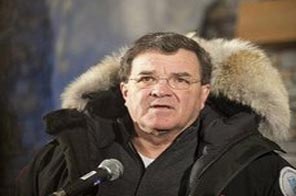G7 finance ministers meet as eurozone roils markets
IQALUIT: Finance ministers and central bankers from leading industrial nations focused Saturday on measures to stimulate a tentative global economic recovery and calming jittery markets as they launched talks in northern Canada.
Topping the agenda for G7 talks, which some have said would be "frank," will be growing concerns over eurozone debt as well as the yuan, which China has been accused of keeping deliberately weak to boost exports to the West.
The state of the public coffers in Spain and Portugal have been causing growing unease, with investors fearing a scenario similar to that in Greece.
Greece has been placed under unprecedented EU surveillance as it attempts to implement austerity measures to slash its massive debt and a 12.7-percent public deficit, while Portugal's deficit hit 9.3 percent last year, its highest since 1974.
"Fundamentally, this is an issue for the European Union, but a number of countries represented here are EU countries, so it's a matter of concern that I'm sure we'll talk about tonight and tomorrow," Canadian Finance Minister Jim Flaherty told reporters here.
European Central Bank chief Jean-Claude Trichet said Thursday the high deficit and debt in some countries was placing an "additional burden" on monetary policy and undermining the bloc's stability and growth pact.
The talks in Canada's frigid far north would also touch on the timing of "exit strategies" from costly stimulus measures undertaken by G7 member governments, as well as concerns about their combined debts of more than 30 trillion dollars.
Flaherty said there would also be "major discussions" about China's currency.
"This is an issue that cannot be avoided," Flaherty said. "It is a G20 issue ... but it is also an issue that concerns Western industrialized countries represented in the G7."
The value of the Chinese currency, which has effectively been pegged to the US dollar since mid-2008, has been a bone of contention between Beijing and its Western trading partners, which say it is kept low to boost exports.
China has kept its yuan weak against the dollar, and critics say this keeps Chinese exports artificially cheap and has fueled a massive trade surplus with the West. China's trade surplus reached 196.1 billion dollars in 2009.
G7 delegates formally opened their talks Friday evening at a hotel restaurant in this capital of Canada's Nunavut territory.
But before getting down to business, the Canadians and Europeans went dog-sledding on frozen Frobisher Bay, an Inuit cultural experience missed by the Americans and Japanese, who arrived at dusk.
The G7 delegates from Canada, the United States, France, Germany, Italy, Japan and Britain were joined by officials from the International Monetary Fund, the World Bank and the European Commission.
With the G20 taking the lead as the world's premier economic forum and the rise of China's economic clout -- poised to overtake Japan as the world's second biggest economy this year -- the G7 is struggling to remain relevant.
The intimate setting and frosty weather foster direct diplomacy here. And there is no shortage of contentious issues to discuss.
Although their economies are more or less stable amid a shaky global recovery, the world's richest nations are promoting diverging economic and financial policies.
They remain at odds, for example, over how to move forward on a regulatory framework for the banking sector.
John Lipsky, first deputy managing director of the IMF, said there was "a broad agreement on basic principles."
"This doesn't mean everybody should do the same thing at the same time, but they should be coherent," he told AFP.
Italy is facing the most heat over its soaring public debt, while the United States, Japan and Britain continue to borrow at levels never before seen.






